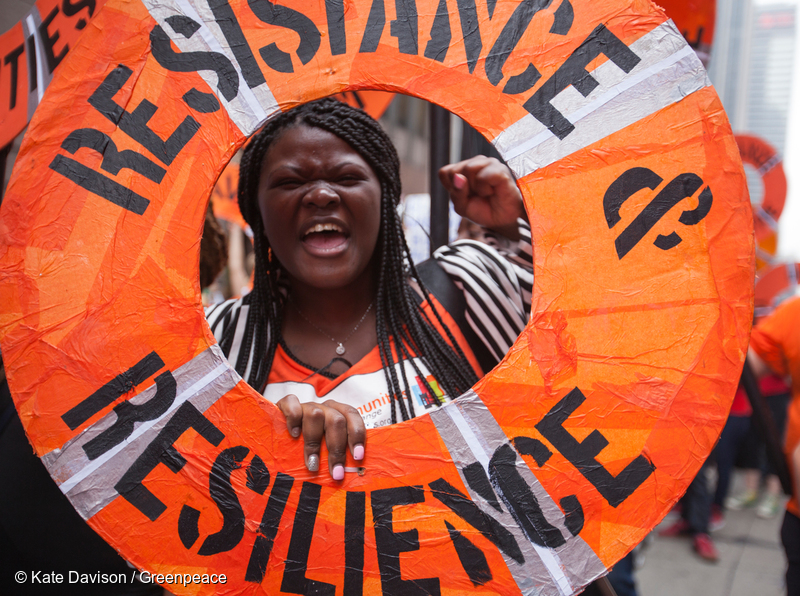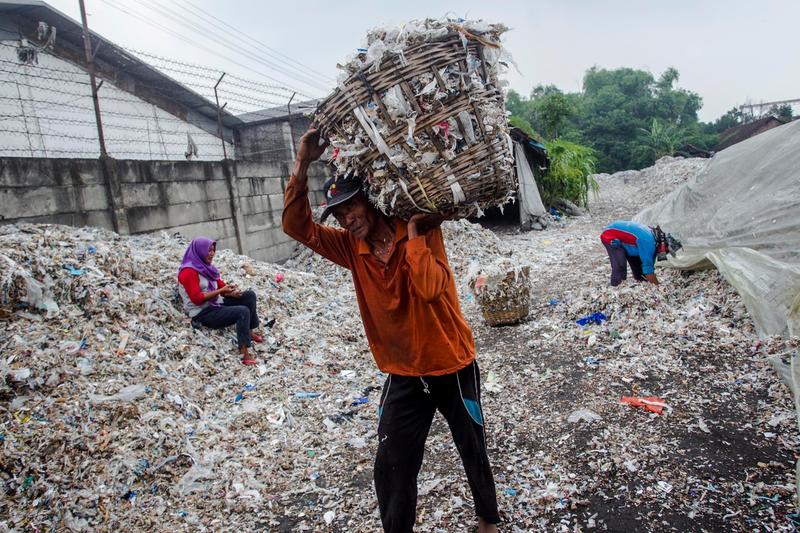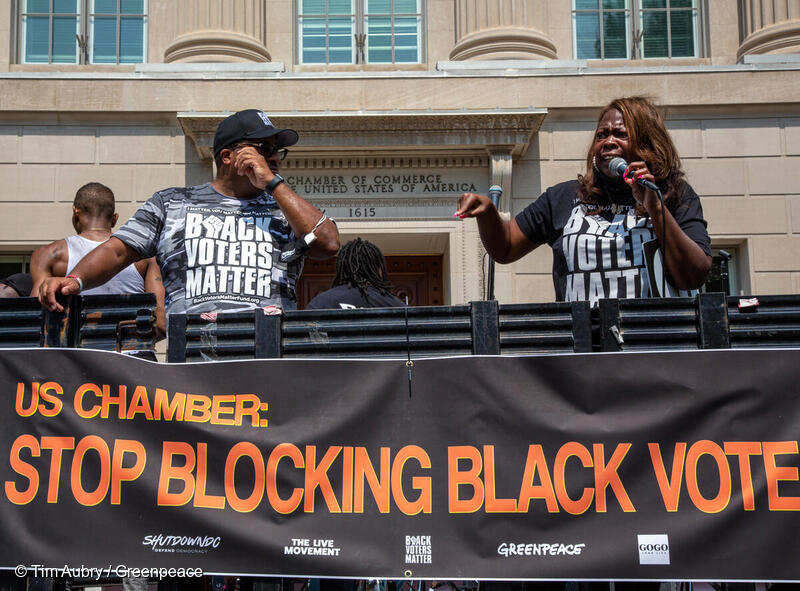We will never create the green and peaceful future we all want if racist systems continue to divide and exploit us. The powerful use that division to continue profiting from the destruction of the environment and to strip us of our dignity, our health, our livelihood, and all too often, our lives.

When I think about a healthy environment, it’s not necessarily the polar bears that first come to mind. For me, it’s my son.
He developed asthma from the polluted air he breathed in our subsidized housing complex in a treeless neighborhood surrounded by major highways. That’s what brought me into the climate movement.
Black and Brown communities, like the ones we lived in then, are the ones being hit first and worst by climate disasters. It is us who are shunned away into “sacrificial zones” at the hands of the oil and gas industry, us who are stripped of our democratic rights when extremist politicians pass anti-voter and anti-protest laws. We will never create the green and peaceful future we want if systems (upheld by people and institutions) of white supremacy, colonialism, privilege, and oppression continue to divide and exploit us. They use that division to continue profiting from the destruction of the environment and stripping us of our dignity, our health, our livelihood, and all too often, our lives.
It is our responsibility, as a movement, to lay bare the interconnectedness between environmental destruction and racial justice, social justice, and Black liberation. We cannot choose between “this or that,” it’s climate justice and racial justice, and it has to be now.
The environmental community must speak out in the face of white supremacy, systemic injustice, and their fatal consequences. We cannot have climate justice without racial justice. This idea is woven through our campaigns:
Climate: Who is impacted first and worst by the pollution and the climate crisis?

A participant in the People’s Climate March shows off her message as she makes her way through the streets of New York City.
“Environmental and climate justice is a civil rights issue. We all depend on the physical environment and its bounty…But not all people are equally impacted. Race — even more than class — is the number one indicator for the placement of toxic facilities in this country hit by climate change.” –The NAACP
I started to hear about “environmental racism” a few years ago. This means – quite simply – that communities of color are systematically disadvantaged and disproportionally harmed by pollution, climate-fueled extreme weather, and policies that force Black, Brown, and economically disadvantaged communities to live closest to environmental hazards, such as oil and gas extraction facilities. A wildly disproportionate number of Black people live in places that are polluted with toxic waste, leading to negative health effects like cancer, asthma, and more. Read more about it in our Fossil Fuel Racism report.
I know this first hand.
Plastics: The plastics industry continues to treat Black and Brown lives as disposable

People in Bangkun Village, Indonesia collect plastic scraps and paper to take to a local factory.
While the world may be slowly transitioning away from polluting energy, towards more sustainable sources, the oil and gas industry has identified plastics as “plan B” to keep their dying industry alive. In fact, because plastic is also made from fossil fuels, it is working hard to expand its demand. They call cheap throwaway plastics “clean and safe” or “recyclable,” but the truth is, they are fueling environmental crises that worsen injustices worldwide. The plastics industry does not create the majority of its plastics to protect us — it creates them to increase profits for fossil fuel giants, and in 2021, like so many other years, while communities of color, such as those in “Cancer Alley” continue to suffer, the industry has seen their profits increase. With their eyes firmly fixed on their self-preservation, they speak of the expansion of one of our planet’s most destructive industries, while black and brown bodies continue to be piled upon the altar of their corporate greed. Read our op-ed in the San Diego Tribune
This black history month, we expect corporations to do more than just blithely acknowledge the contributions of people of color to the development of this country. We call on them to act quickly to transform words into action and provide a just transition by investing in solutions targeted at assuring a livable future for these communities, including repairing the historical injustices that have been imposed on them.
Democracy: For democracy to work for all of us, it must include us all

LaTosha Brown and Cliff Albright with Black Voters Matter addresses the rally.
We only have a few more years left to reduce the power of oil and gas companies, and other corporations polluting our communities and democratic systems, before surpassing climate thresholds and finding ourselves at a catastrophic point of no return. Our democracy should be our best tool for advancing climate solutions, but it has been hijacked by fossil fuel interests. Millions of people, especially Black and Brown communities, are blocked from participating because of restrictions on voting rights and the corroding influence of corporate money in politics
We know the system is not broken, it was built this way. The core institutions and mechanisms of democracy are constantly threatened, including freedom of speech, a free press, protection of historically marginalized groups, and the independent judiciary.
From unprecedented amounts of dark money flooding our politics, to restrictions on our freedom to vote that disproportionately impact Black and Brown communities, we’ve seen the harm that happens when our politics are not people-powered. Voting rights preserve all rights, whether it is our rights to a living wage, healthcare, equal housing opportunity, or a clean environment.
Yet this year we’ve seen an unprecedented attack on our democracy. The biggest threat comes from the dozens of bills passed in at least 19 states that make it harder for us to vote. We’ve also seen a wave of new anti-protest laws designed to intimidate and criminalize peaceful, non-violent protesters, many driven by the secretive American Legislative Exchange Council (ALEC).
Many companies that claim to support civic participation and racial justice have stood idly by as these attacks unfold. Worse, many of the politicians they contributed to financially are the same ones introducing these laws. That’s unacceptable. We need companies to choose a side and prove in meaningful ways that they stand for democracy. AT&T is one of those companies!
